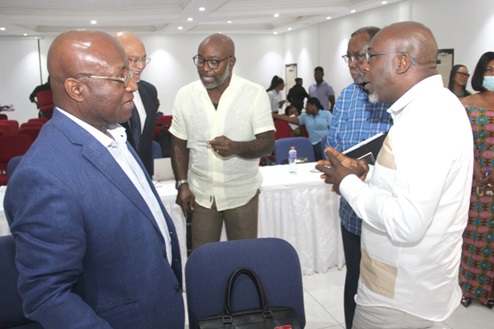
Towards good parliamentary democracy: Hybrid system won’t work - Justice Dotse asserts
A retired Justice of the Supreme Court, Justice Jones Dotse, says the current hybrid parliamentary system where members of parliament can serve both the Executive and Legislative arms of government at the same time will not work for Ghana’s democracy and good governance.
He, therefore, urged Ghanaians to choose between a pure presidential system where the President appoints ministers from outside Parliament or a parliamentary system where all ministers come from Parliament.
This, he believed, would do away with the hybrid system where some ministers come from Parliament and others are picked from outside.
“Sometimes, you go to Parliament and a minister is supposed to answer questions but he is not on the floor of Parliament; but if all the ministers are from Parliament and he knows he is an MP he will be present,” he said.
Read also: Time to amend constitution to do away with winner-takes-all - Haruna Iddrisu
Check on Executive
Speaking at a stakeholders’ consultations to validate the preliminary report of the Constitutional Review Consultative Committee (CRCC) report in Accra last Friday, Mr Justice Dotse said, “But when they are all outside Parliament, then the MPs have complete oversight over the Executive as happens in the American system. This hybrid, for me, will not work,” he stressed.
Article 78(1), which dwells on appointment of majority of ministers from Parliament, states that: “Ministers of State shall be appointed by the President with the prior approval of Parliament from among members of Parliament or persons qualified to be elected as members of Parliament, except that the majority of Ministers of State shall be appointed from among members of Parliament".
The event is being attended by representatives from the Attorney-General’s Department, current and retired members of the Bench, Ghana Bar Association, the Judiciary, current and former MPs, ministers of state, members of the Diplomatic Corps, policy think tanks, traditional leaders, civil society, the clergy and private citizens.
Validation
The participants will review and validate the preliminary report of the CRCC, build consensus and nurture ownership of the constitutional review process.
The output of the report will be used as the foundation for a sovereign national conference to solicit a buy-in of Ghanaians for a possible holistic review or isolated amendments of the 1992 Constitution as stakeholders might determine.
It is being organised by the Ministry of Parliamentary Affairs, which constituted the review of the report of the 2010 Constitutional Review Commission (CRC), its accompanying White Paper and consider other provisions that might lend themselves to possible review.
This exercise is to enable the ministry to follow up on the effort that started in 2010, apprise itself of matters that have emerged thereafter and identify specific provisions in the 1992 Constitution that could engender debate for the review of the Constitution.
Capping of SC appointments
Sharing his perspective on the capping of Supreme Court Justices’ appointments, Justic Dotse said having exited the apex court, he was deeply worried over how Justices of the court were overwhelmed with cases.
He said the Constitution had given too many jurisdictions to the judges of the court and, “so maybe we have to look at reducing the jurisdiction of the Supreme Court”.
“We can limit some of the civil appeals that start from the district courts to end at the Court of Appeal and other criminal cases so that the Supreme Court exists for constitutional cases and other various serious issues,” he said.
That, he said, would prevent the apex court from stretching itself to handle cases and do what “I find very impossible”.“
You can be given 25 to 30 briefs to just go over a weekend and just come and sit the following week and it is really telling on the health of the judges,” he said.
He, therefore, called on stakeholders to consider the amendment of the 1992 Constitution dispassionately without “partisan considerations.”
“If we deal with the issues that confront us, we will come out with very good decisions,” Mr Justice Dotse said.
Broad engagements
The Minister of Parliamentary Affairs, Osei Kyei-Mensah-Bonsu, said over the past six years the ministry had engaged a cross-section of the Ghanaian society in respect of the usage and application of the 1992 Constitution and its effect on ensuring efficient and effective governance that “yields the blessings of liberty, equality of opportunity and prosperity for all the Ghanaian people”.
The diverse stakeholders that the ministry had engaged included the Attorney-General (representing the Office of the President), ministers of state, former President John Agyekum Kufuor, the Office of former President John Dramani Mahama, Parliament of Ghana, and Members of Parliament, the Judiciary, the independent governance institutions, civil society and think tanks.
Others, he said, were from academia, chiefs, employers, employees, organised labour, faith-based organisations and the public.
“These people and bodies recognise the strides the country has made since January 1993 when the country experienced a rebirth under the Fourth Republican Constitution.
“However, they are unanimous in their observation that the citizenry is not having the optimum benefits of the dividends of democracy.
“In that regard, they variously concluded that there is an urgent need to revisit the 1992 Constitution with a view to improving the delivery of governance to upscale a well-thought-through structured, sustainable national development, which will secure improvement in the living conditions of the Ghanaian people,” he said.
